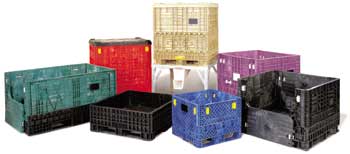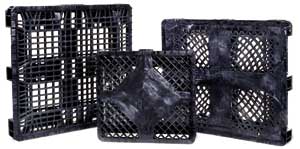May 27, 2002
|
Molders of industrial pallets and containers might have just gotten a boost in business thanks to new regulations that will affect the import and export of wood pallets and containers. Fears of insect infestation from these wood products are giving some countries the jitters. In fact, the EU is expected to request heat treatment of all solid wood pallets and containers by 2003, according to an article that appeared in a magazine published by the National Wooden Pallet & Container Assn.
Hardwood in exported, mixed softwood/hardwood pallets is no longer subject to the heat treatment requirements of the USDA's Animal & Plant Health Inspection Service (APHIS). However, the APHIS added two treatment methods—fumigation and chemical pressure impregnation—to its official program for U.S. nonmanufactured wood packaging. China and Australia began requiring heat treating in early 2001.
Snider Mold Co. (Mequon, WI) recently shipped a two-cavity pallet mold to a South African company that is concerned about the future of wood pallets. Jim Meinert, director of international marketing at Snider, says that there are many reasons why wood pallets and containers won't be acceptable in the future, including a wood shortage in many countries, fears of insect cross-contamination that might threaten a country's agricultural business, and the environmental issues surrounding recycling.
He adds that Europe is doing the most to eliminate wood pallets and containers, while this trend gains momentum in Mexico and South America. One South African customer fears an eventual worldwide ban on wood pallets and containers and is trying get a jump on the market by moving to plastic pallets.
Reuse, Recycle
Additionally, Meinert says molded plastic pallets and containers last seven to 10 times longer than their wood counterparts and can be sterilized. "If they fail or get old, you grind them up and make more," Meinert says. "They provide a good application for recycled materials as well—particularly HDPE and PET can be recycled into pallets."
This is good news for people like Meinert, who builds molds for the industrial pallet and container market, and for molders like Linpac Materials Handling (Georgetown, KY). James Dobell, president of this molder of containers and totes, says there is a trend toward plastics because of its reusability. Although reusability in materials handling packaging is not new—Europe has been committed to reusable containers for more than 25 years—it is beginning to catch on in the U.S.
There are several reasons for this, including the increased cost of disposal of corrugated cardboard and wood, and "reduced packaging costs through the use of efficiently managed reusable container systems," says Dobell, who also serves as president of the Reusable Pallet & Container Coalition.
Other economic advantages are to be found in replacing wood or cardboard with plastic in these container applications. "A plastic tote costs $5 vs. $1 for a [paperboard] box. A reusable plastic pallet will cost about 2.5 times that of an equivalent wooden pallet. If the right container/pallet is used with appropriate controls, the life cycle of these products will reduce the cost per trip significantly," says Jim Milligan, manager of Food Container Systems for Linpac. He notes that there are fewer than 15 million plastic produce totes in use today, accounting for less than 2 percent of all produce shipments. Plastic totes for beef and chicken number even less, he adds.
If the food packaging industry has been slow to embrace reusable containers, automotive has picked up the slack. Suppliers send parts in collapsible pallets that go directly to the assembly line. When empty they are then returned to the parts supplier for refilling.
|
"The amount of waste is down 75 percent in these big plants," says Dobell, who adds that in many manufacturing plant environments cardboard is not allowed on the production floor because of contamination. "RPCs [reusable plastic containers] take enormous amounts of packaging costs out of the system."
Dobell says that he feels good about Linpac's business because it makes the world a better place environmentally, and his business better financially. "It takes costs out [of products] and ultimately benefits the consumer. RPCs and reusable pallets are gaining a big share of the marketplace very quickly," he adds.
Meatier Issues
Changes in the meat processing industry are also working to encourage the use of RPCs. Milligan says there are two issues driving the meat side of the business: a lack of trained meat cutters and safety regulations.
"The meat-cutting trade is changing," says Milligan. "[Meat cutters] are being relocated from local stores to centralized meat packaging plants, resulting in reduced costs and improved compliance with USDA regulations."
Also, because meat is processed and placed into actual consumer packages at large processing plants, RPCs are widely used in shipping. "They're not shipping half a cow anymore, but retail-ready packages," says Milligan. "What is driving the meat side is the move to centralize case-ready meat packaging."
Although there is some resistance to plastic pallets and containers by the forest products industry, even the big makers of wooden pallets and containers are looking into plastic as a viable alternative. Richard Elmore, president of Exel Tool & Mold (Seymour, IN), specializes in building large molds and says he's built many pallet and container molds over the past 20 years. Although he hasn't seen an increase in requests for these molds lately, he has been visited by wooden pallet makers exploring the costs of converting to plastic.
However, unlike Linpac's Dobell, he sees the move to reusable shipping containers as more gradual. "The potential for the industry is huge," says Milligan, "but the industry is slow to turn because we're a throwaway society. Packaging costs can be high, but are paid for by the consumer and, therefore, there is little incentive to change."
You May Also Like




